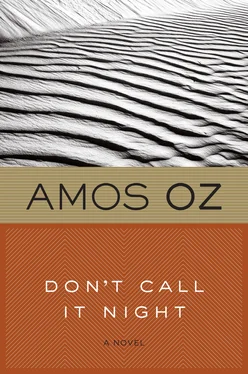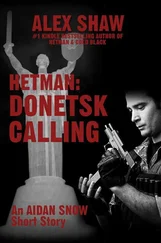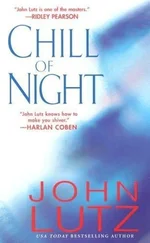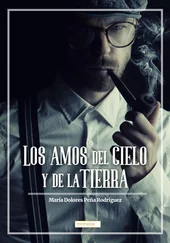Amos Oz - Don't Call It Night
Здесь есть возможность читать онлайн «Amos Oz - Don't Call It Night» весь текст электронной книги совершенно бесплатно (целиком полную версию без сокращений). В некоторых случаях можно слушать аудио, скачать через торрент в формате fb2 и присутствует краткое содержание. Год выпуска: 1997, Издательство: Mariner Books, Жанр: Современная проза, на английском языке. Описание произведения, (предисловие) а так же отзывы посетителей доступны на портале библиотеки ЛибКат.
- Название:Don't Call It Night
- Автор:
- Издательство:Mariner Books
- Жанр:
- Год:1997
- ISBN:нет данных
- Рейтинг книги:4 / 5. Голосов: 1
-
Избранное:Добавить в избранное
- Отзывы:
-
Ваша оценка:
- 80
- 1
- 2
- 3
- 4
- 5
Don't Call It Night: краткое содержание, описание и аннотация
Предлагаем к чтению аннотацию, описание, краткое содержание или предисловие (зависит от того, что написал сам автор книги «Don't Call It Night»). Если вы не нашли необходимую информацию о книге — напишите в комментариях, мы постараемся отыскать её.
Notable Book of the Year
“A rich symphony of humanity. . If Oz’s eye for detail is enviable, it is his magnanimity which raises him to the first rank of world authors.” —
(UK)
At Tel-Kedar, a settlement in the Negev desert, the longtime love affair between Theo, a sixty-year-old civil engineer, and Noa, a young schoolteacher, is slowly disintegrating. When a pupil dies under difficult circumstances, the couple and the entire town are thrown into turmoil. Amos Oz explores with brilliant insight the possibilities — and limits — of love and tolerance.
“Vivid, convincing, and haunting.” —
Don't Call It Night — читать онлайн бесплатно полную книгу (весь текст) целиком
Ниже представлен текст книги, разбитый по страницам. Система сохранения места последней прочитанной страницы, позволяет с удобством читать онлайн бесплатно книгу «Don't Call It Night», без необходимости каждый раз заново искать на чём Вы остановились. Поставьте закладку, и сможете в любой момент перейти на страницу, на которой закончили чтение.
Интервал:
Закладка:
Within ten minutes I had learned that she was a literature teacher, that she had been born and lived until a few years previously in a village at the eastern end of the Hefer Valley, that she had started really living, as she put it, shockingly late, because she had been saddled with a violent, childlike crippled father, that she had hardly any other relatives, and that her name was Noa. You're Theo, I've heard about you, you're quite a legend hereabouts. I had some kind of breakdown in Tel Aviv, but let's not go into that, some friends arranged for me to come out here partly as a receptionist in the Embassy and partly as a teacher for the little Israeli colony. That's right, how did you guess, the coffee I made us really is radioactive. I slipped an Indian thing into it, a powdered root, no, it's not exactly like the cardamom the Yemenites back home use, it makes your head spin more, and I also added half a glass of French brandy. There, I've given away most of my secrets. Of course I didn't ask you if I could put things in your coffee. Why should I? Here, have another cup. You don't look to me like a man who is likely to get drunk or lose control. Rather the opposite. Always in control.
When the security officer arrived and handed me my envelope I thanked him and her and took my leave. But she wouldn't dream of letting me go: Wait, Theo. They say you've been living among the Indians for ten years. Will you take me? It'll be worth your while. If you say yes I'll teach you how to control pain by regulating your breathing.
I supposed she must have belonged to one of those mystical groups that were so popular in Tel Aviv. I was determined to escape while there was still time from this mercurial school-teacher with her tricks for regulating your breathing. Despite which I agreed to go out with her that evening to a concert by an orchestra and choir from Berlin: she had a double ticket and without me she wouldn't be able to go, it wasn't that easy here for a woman to go out at night by herself, and she promised that the programme included Schubert's Mass in B Flat Major. For years I hadn't heard Schubert except through the earphones of the little cassette player that went everywhere with me.
That evening it turned out that she didn't know any breathing exercises: she had just fancied me and didn't want me to disappear. If I insisted on my rights, she would take a correspondence course in controlled breathing and discharge her debt when she'd completed it. Fancy wasn't the right word, she said. Actually I had struck her as someone who was imprisoned in my own dungeon and I made her want to try to reach me so I wouldn't freeze down there in the dark. Even now I can't express myself the way I want to, imprisonment, dungeon, it's all your fault, Theo, it's because of you that I'm talking in metaphors and that it won't come out right. Am I ridiculous? Then you must accept the blame. Look what you've done to me. It's your fault I'm ridiculous. It's because of you I'm blushing, too. Look.
After the concert she invited me out to eat roast veal at a restaurant she'd heard was considered one of the best in the Western Hemisphere. The restaurant, empty apart from the two of us, was full of folksy decorations and waiters dressed as gauchos. It was nothing more than a tourist trap. The meat and the wine were crude and tasteless. The candle at our table had a repulsive greasy smell. As for the ensemble from Berlin, it turned out that they had performed the Schubert the previous night. We were treated to Hindemith and Bartók. To cap it all, when we were leaving the concert hall the heel of her left shoe broke, and as we were getting out of the taxi her wristwatch caught my forehead and gave me a nasty gash. I've blown it, she said, with a touching smile by the light of the street lamp outside her apartment: I've lost my Indian village.
The first Sunday after that evening, a rogue cobbler having stuck an odd heel on her shoe, I took her over dirt tracks in the Development Agency Jeep to see an Indian village not far from Calabozo. We drove for five hours each way. We saw a wedding carnival, half Catholic, half pagan: in a dark, ecstatic ceremony, accompanied by strange songs that at times resembled howls, a pretty widow was paired off with a half-dazed, perhaps slightly drugged, youth, who seemed to us no more than fifteen years old. Next day I flew back to Mexico. We continued to meet each time I passed through Caracas, every few weeks, and I would bring her a bottle of Napoleon brandy so that she would have something to lace her magic coffee with, together with her powerful native brew. Instead of the secret of breathing control that she had made up the first day so I wouldn't get away I discovered another secret in her that came to fascinate me: whenever she met a stranger, even by chance, she would immediately spot any malice. Or hypocrisy. Or generosity. Even people I myself saw as being complicated, enigmatic, well hidden behind a polished image or disguised by perfect manners, she could apparently identify as being good or bad: wicked, naive, generous, stagnant — that was how she classified everybody. And also as warm or cool. In fact she didn't so much classify them as set people, places or opinions on a temperature scale. As though she were grading pupils' work from forty to ninety. What's this supposed to be, I protested, a court-martial? A people's tribunal? And Noa replied: It's easy, anyone who wants to know what's good and what's bad knows. If you don't know, it's a sign you don't want to know. I find you quite attractive. You seem to find me attractive, too. But you absolutely don't have to answer that.
Was she really always correct in her lightning judgments? Or more times than not? Sometimes? I couldn't check any more, because with time I began to see people through her eyes: icy, warm, tepid, generous, villainous, compassionate. How about me? Am I hot or cold, Noa? Or would I be better off not asking? To which she replied instantly, unhesitatingly: You're warm but getting colder. Never mind, I'll warm you up. And she added: Not bad. A bit domineering. You drive the Jeep brilliantly — it's not so much driving, more like a rodeo.
And sometimes she looked to me again just the way she looked the first time we met, at the Embassy, an energetic, well-meaning, judgmental Israeli schoolteacher. Her beauty was written all over her in capital letters. Wafting all around her a faint but unmistakable scent of honeysuckle. But I found nothing repellent in all of this. On the contrary, there were times when her presence filled me with childlike excitement, like a creature that has been brought indoors and from now on is going to be well looked after. I gradually discovered how fine and how effortless was her emotional range, maternal one moment, girlish the next, or seductive, and most of the time sisterly. What's more, she revealed to me a childlike sense of humour, "the horse is the main protagonist in the history of the Latin peoples", a humour that gave me a strange urge to cover her shoulders carefully. Even when it was not cold. Indeed the first present I bought her was a Caribbean woollen scarf. When I first laid it round her shoulders, so white and delicate with a tiny brown birthmark near the nape, there was a moment of mystery and joy: as though it were not me covering her shoulders, but her suddenly covering all of me.
Once when we were visiting the ruins of a gloomy church from the time of the first settlers and as usual I delivered a historical précis, she interrupted me with the words, See for yourself, Theo, how light you are now.
At these words I trembled like a boy to whom an experienced woman, from the heights of her expertise, perhaps as a joke, has revealed that he is apparently blessed with what in due course will make women desire him. I leaned over and kissed her. On her hair for the time being. She did not return my kiss but reddened and burst out laughing, Look, Theo, it's so funny, your bossy moustache has started quivering. And yet when we met in Caracas, Noa and I, I was fifty-two, I had been loving various sorts of women for thirty years, I was, in my own opinion, an expert, I was acquainted with menus of pleasures such as she had not seen in her wildest dreams, if she had ever had wild dreams. I imagined not. Despite which, the words she spoke to me in the ruins of that church, See for yourself how light you are now, moved me so powerfully that I had to remind myself almost by force that I had stopped in the eighteenth century and I had yet to tell her about how the church and the whole town had collapsed in the great earthquake of 1812 and about the cyclical element that really underlay the shifting power-alliances between the Church, the secret service, the Maoists, the army, the Liberals, and the Republican Guards. I recommenced my lecture, and continued it passionately, lingering over each detail, digressing, enthusing, embarking on Borgesian myths, until she said, That's enough for today, Theo, I can't take any more in.
Читать дальшеИнтервал:
Закладка:
Похожие книги на «Don't Call It Night»
Представляем Вашему вниманию похожие книги на «Don't Call It Night» списком для выбора. Мы отобрали схожую по названию и смыслу литературу в надежде предоставить читателям больше вариантов отыскать новые, интересные, ещё непрочитанные произведения.
Обсуждение, отзывы о книге «Don't Call It Night» и просто собственные мнения читателей. Оставьте ваши комментарии, напишите, что Вы думаете о произведении, его смысле или главных героях. Укажите что конкретно понравилось, а что нет, и почему Вы так считаете.












